Written in collaboration with Brook Edmondson, PPC Director at Linear
The internet is swimming with long lists of (often good!) Facebook Ad examples. But for medical service providers or med-tech companies, your next paid social campaign should be fueled by something more than “general advice.”
At Linear, healthcare and chiropractic marketing is one area we specialize in.
So we compiled 19 examples of Facebook Ads for healthcare that illustrate industry-specific advertising best practices and break down the tactics that make each excel.
1. Stanlick Chiropractic – Boost new patient sales with Radius Targeting
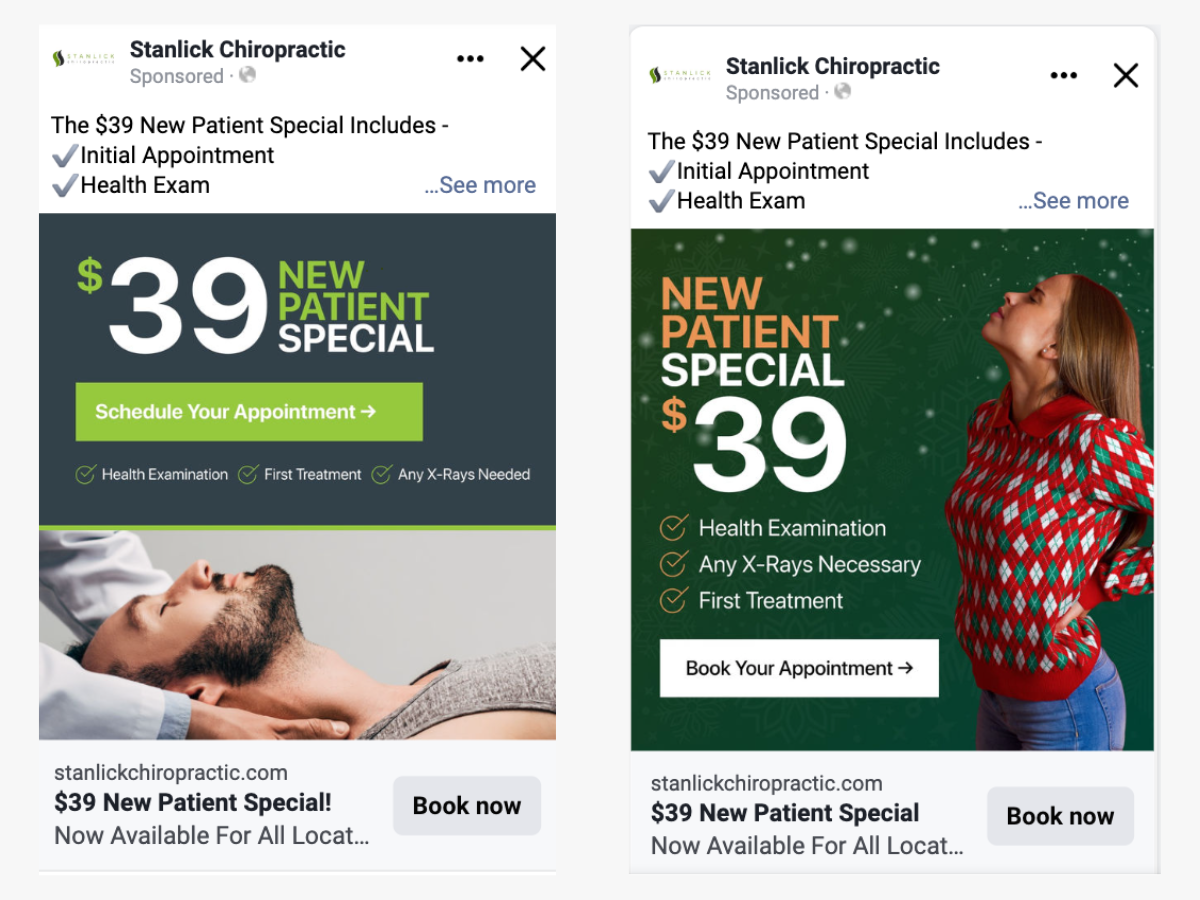
Offering specials and discounts around chiropractic services isn’t a new tactic.
But it is an effective one, if you do the math first. Adjust coupons and discounts using your average lifetime customer value. Usually, these promotions make the most sense for procedures or businesses that require repeat services, upsells, or a high % of repeat customers.
What’s key when running a promotion like this is adjusting your ad targeting, so the most qualified people (the ones who want to come in for the service) see your ad.
If your targeting is too broad, you risk attracting too many clicks from people who aren’t qualified to become your patient. Poorly targeted ad campaigns lead to poor lead quality, increased costs per lead, and a limit on exposure to buy-ready users.
On the flip side, Facebook (now Meta) now restricts some detailed targeting options that “relate to topics people may perceive as sensitive, such as targeting options…that relate to health.”
See how the change impacts advertising your health brand on Facebook?
These restrictions affected the new patient promotion we ran for Stanlick Chiropractic, causing a temporary decrease in conversions.
Our solution? We made demographic targeting less granular, instead implementing radius targeting around our client’s location.
Even with the adjustments, this ad campaign reliably drives 8-10 new appointments for Stanlick Chiropractic monthly.
In Meta Ads Manager, you can set up similar audiences by creating a Saved Audience and adjusting Locations, especially by postal code or address.
🤓 More on this topic: Facebook Saved Audiences – All you need to know
2. Vanguard Spine & Sport – Blast through performance plateaus with split tests
Want to push the envelope on the number of new bookings or inquiries your ad campaigns can generate?
Paired with data-driven hypotheses, we often use split tests.
Split tests allow you to adjust ad features like copy, creative, and in-creative text and test them against an existing ad or ad set.
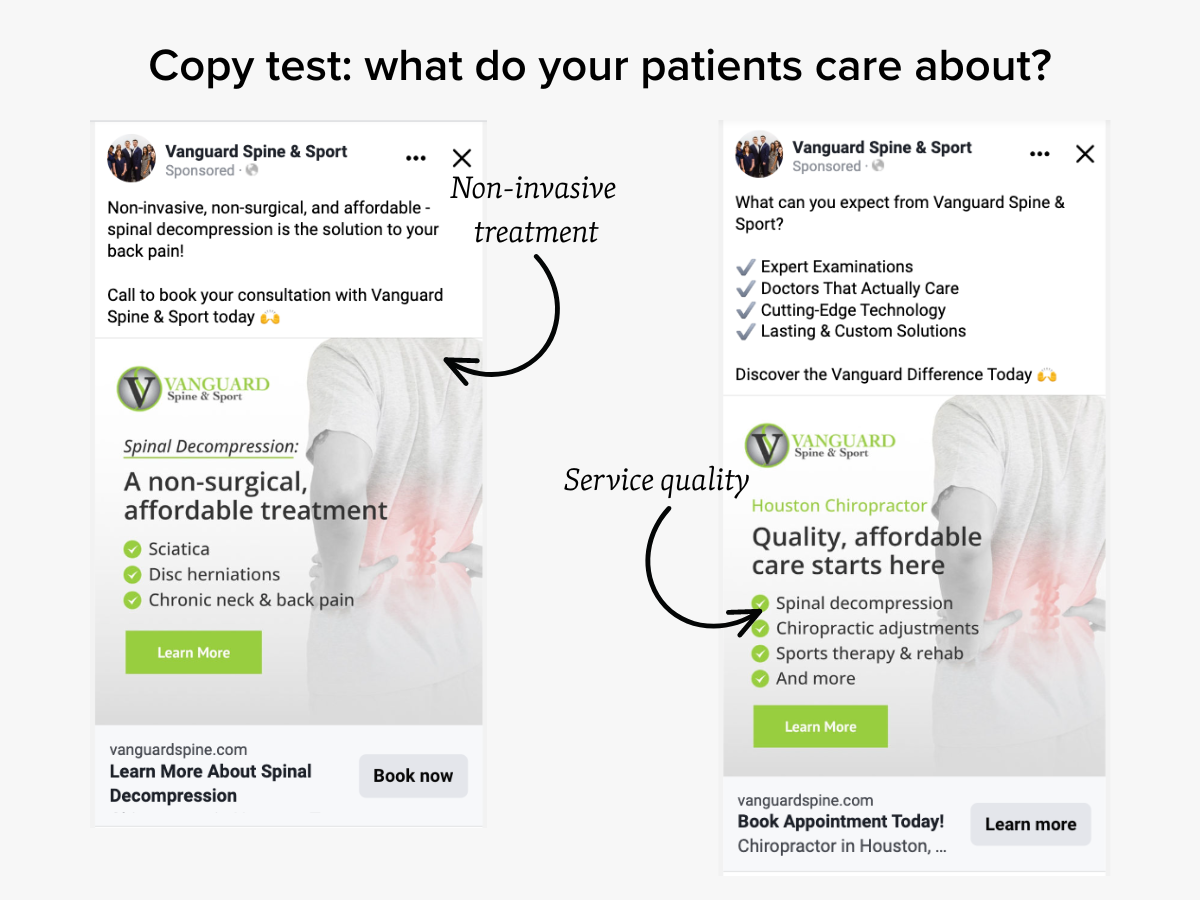
From web optimization expert Nick Gibson:
“Differing from a standard A/B test, you can’t (scientifically) attribute the success of a split test to a single element change. However, this type of test can strengthen confidence in hypotheses and insights from other A/B tests and can shed light on how user trends are evolving.”
In this case, for this particular audience, the variant for non-invasive treatment received three times as many conversions as the original ad.
Without our testing program, we would’ve left those new patient sign-ups on the table!
An important note: your Facebook health ads must comply with Meta’s personal attribute ad standards, which “don’t allow advertisers to run ads that assert or imply the personal attributes of their audience.”
Instead, focus on your offer or service. With Vanguard Spine & Sport, we focused on the benefits of spinal decompression rather than references to patient symptoms like “your back pain.”
🤓 More on this topic: What is Split Testing? The Marketer’s Ultimate Guide
3. Premier Liposuction – Stay meta-compliant with lifestyle-focused images
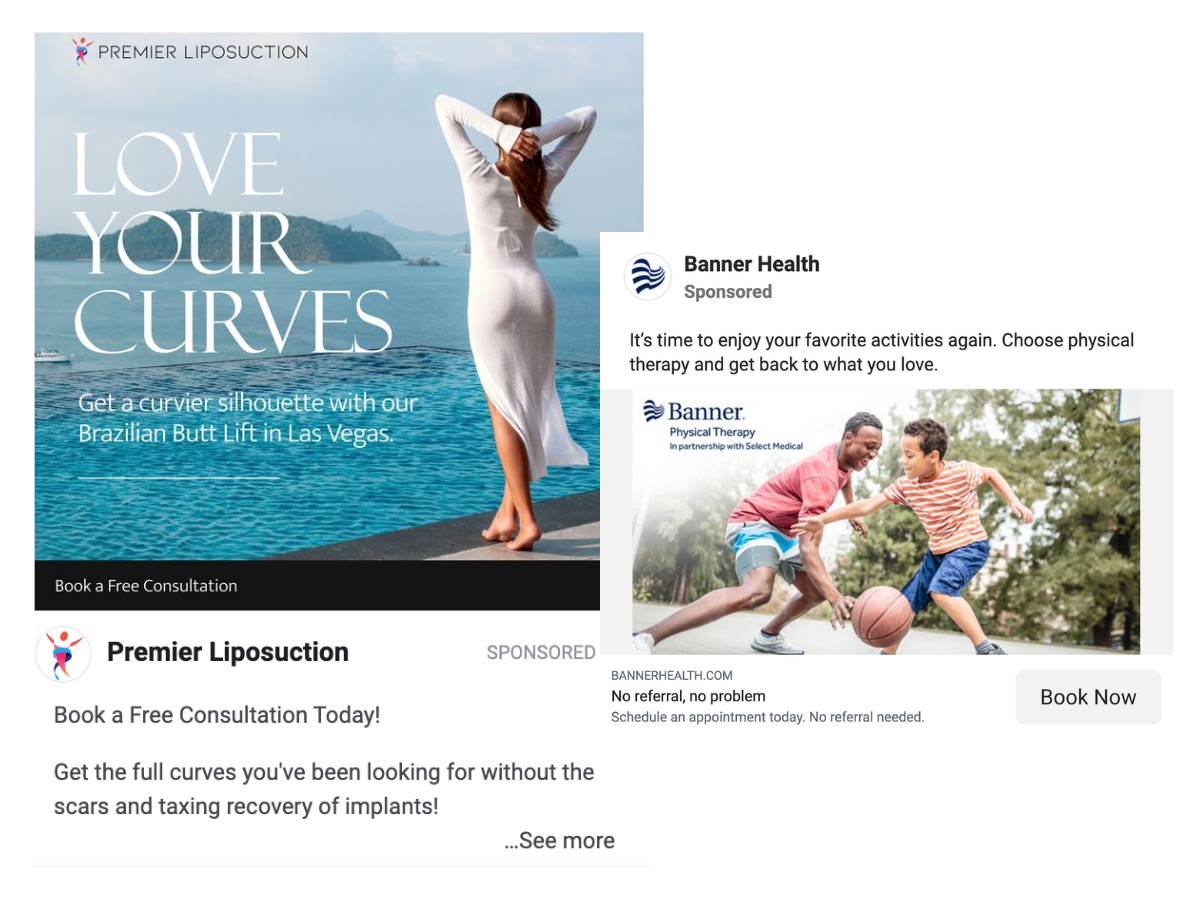
Facebook advertising standards on Personal Health and Appearance
You can read more about these standards here. But in essence, Facebook restricts advertisers from running ads for products or services relating to health and appearance if they cause users to have negative self-perception.
This is a bit of a curveball for cosmetic, dermatology, and plastic surgery brands and clinics that have historically relied on images and copy relating to before-and-afters to promote their services.
An easy adjustment for these brands is shifting to lifestyle images and focusing on benefits.
When running a campaign for Premier Liposuction, we chose full-body silhouettes and images of people on a beach or enjoying themselves. The copy focuses on what sets their service apart from competitors.
4. Coachcare – Make your offer make sense
Are you likely to accept a marriage proposal on the first date? Probably not.
Well, it’s the same with Facebook Ads. If your audience is top (TOFU) or middle-of-funnel (MOFU), they’re unlikely to take an offer that’s more appropriate for bottom-of-funnel, like a demo call.
Coachcare–a remote patient monitoring (RPM) and virtual health solutions provider–is a great example of the impact of matching your audience temperature to your lead magnet.
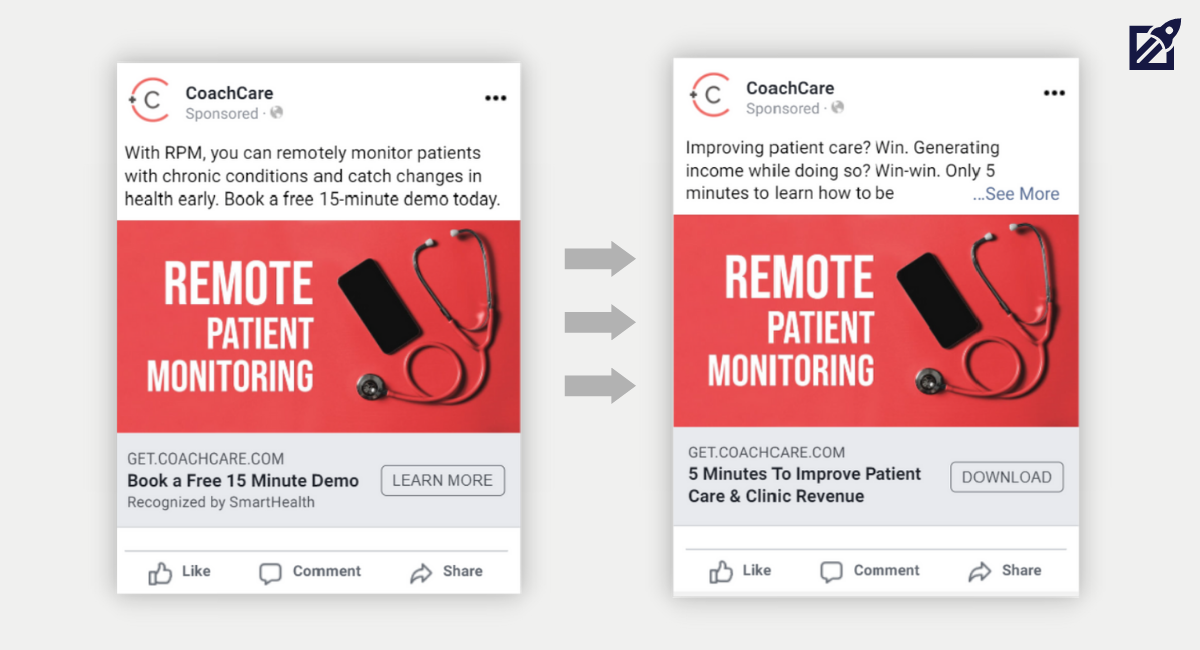
Using demos as an offer for their TOFU / MOFU audience resulted in some pretty frustrating initial outcomes:
- 1.01% conversion rate
- >$400 CPA
- Unqualified leads
- Sales closing ratio that didn’t match the
By applying The Wedge Method and changing their CTA / lead magnet to an e-book download, Coachcare increased their demo conversion rate by 1647%.
You can use this resource to make sure your Facebook ad offers make sense for the marketing stage your audience is in:
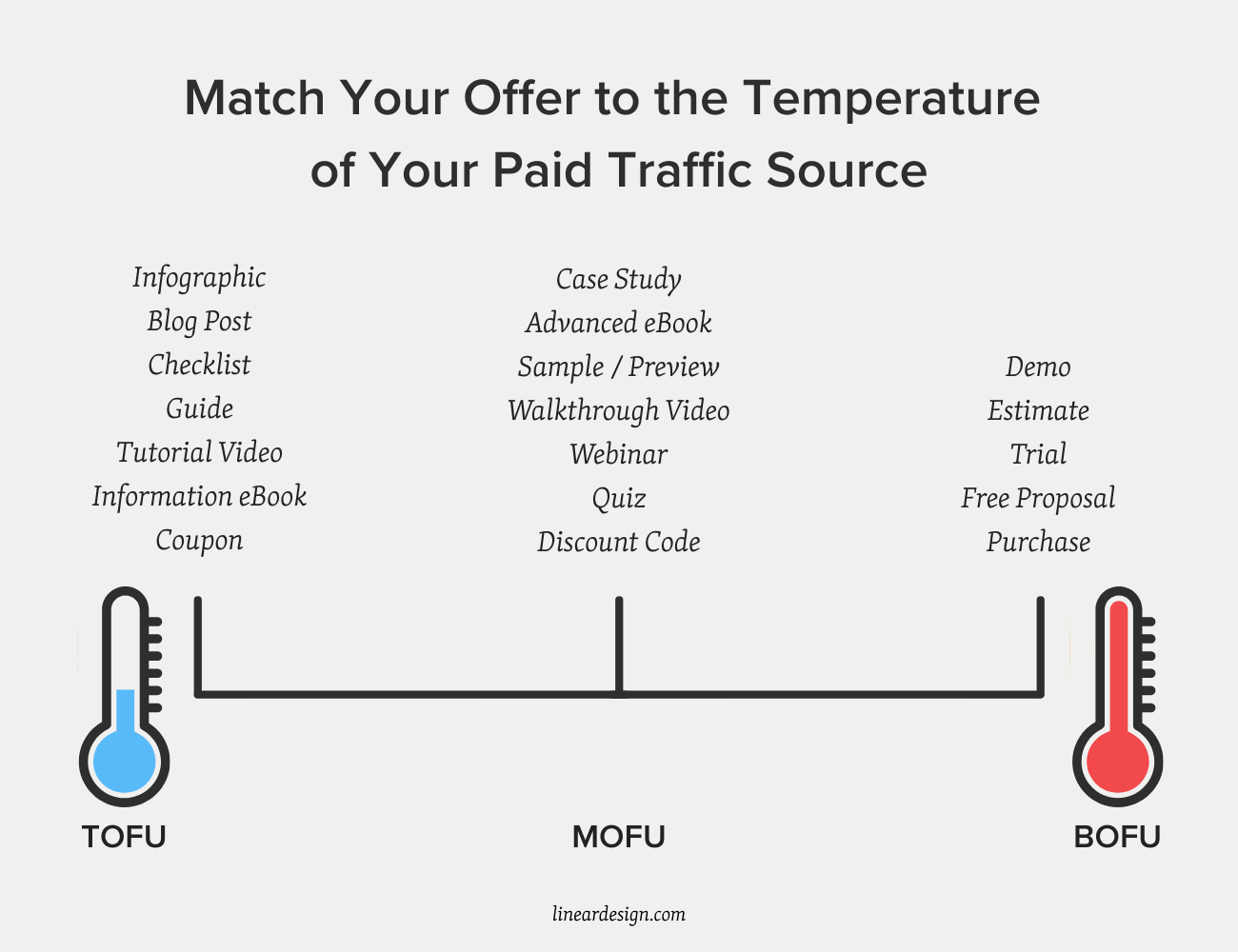
🤓 More on this topic: How to Get 1647% More Conversions With The Wedge Method [CRO Case Study]
5. Mindbloom – Inspire trust with social proof
If you could only include one element in Facebook ads for healthcare, it’d be trust signals, particularly social proof.
“In marketing, trust signals are symbols, icons, messages, and design elements used on web pages to build trust, reduce perceived risk and increase feelings of security for users interacting with an online business.” – What Are Trust Signals?
In a Bazaarvoice survey, 65% of respondents were likelier to take product recommendations from everyday social media users or subject matter experts than brands or influencers alone.
That means social proof can inspire consumer trust in your brand, product, or service, making them more likely to engage, subscribe, and buy from your business.
Mental health and wellbeing company Mindbloom knows this – which is why they inject ratings, reviews, and patient testimonials into almost every ad set in their advertising arsenal.
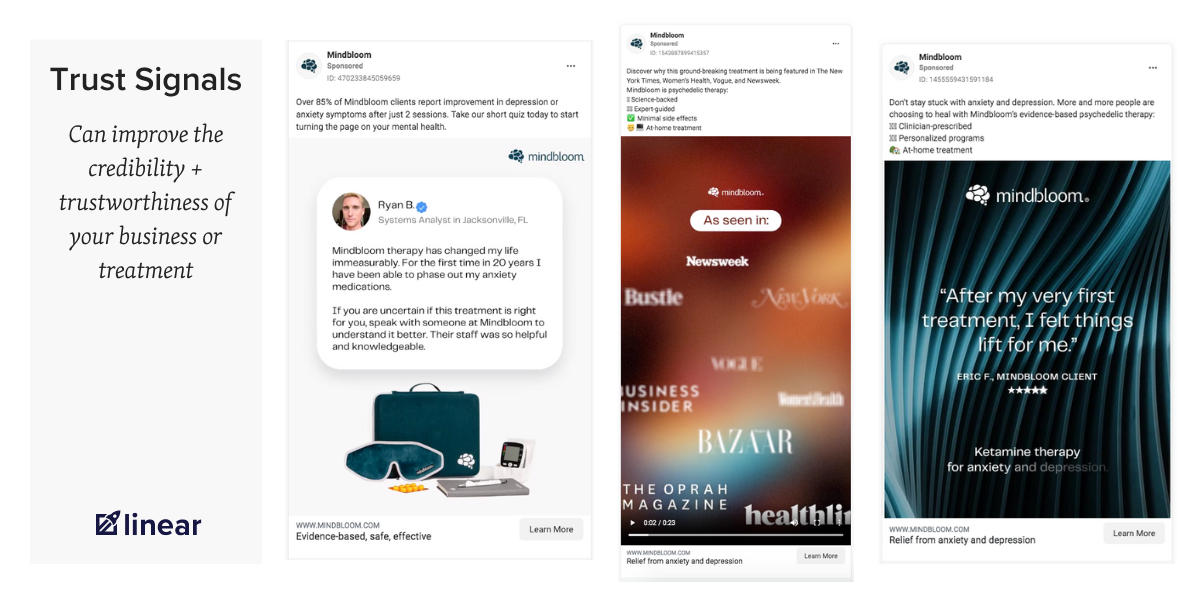
The desire for testimonials during buying decisions is especially true of younger, under-25 audience segments – which you’ll find in spades on Instagram—if this sounds like your target demographic, testing social proof in your ad mix is a must.
🤓More on this topic: Trust Signals: A Key to Consistent Page Conversions (2022 Guide)
6. Verywell Health – Engage audiences with relevant content
In a world stuffed full of CTAs and high-friction marketing offers, it’s refreshing to see ads from healthcare brands delivering value to their audience first.
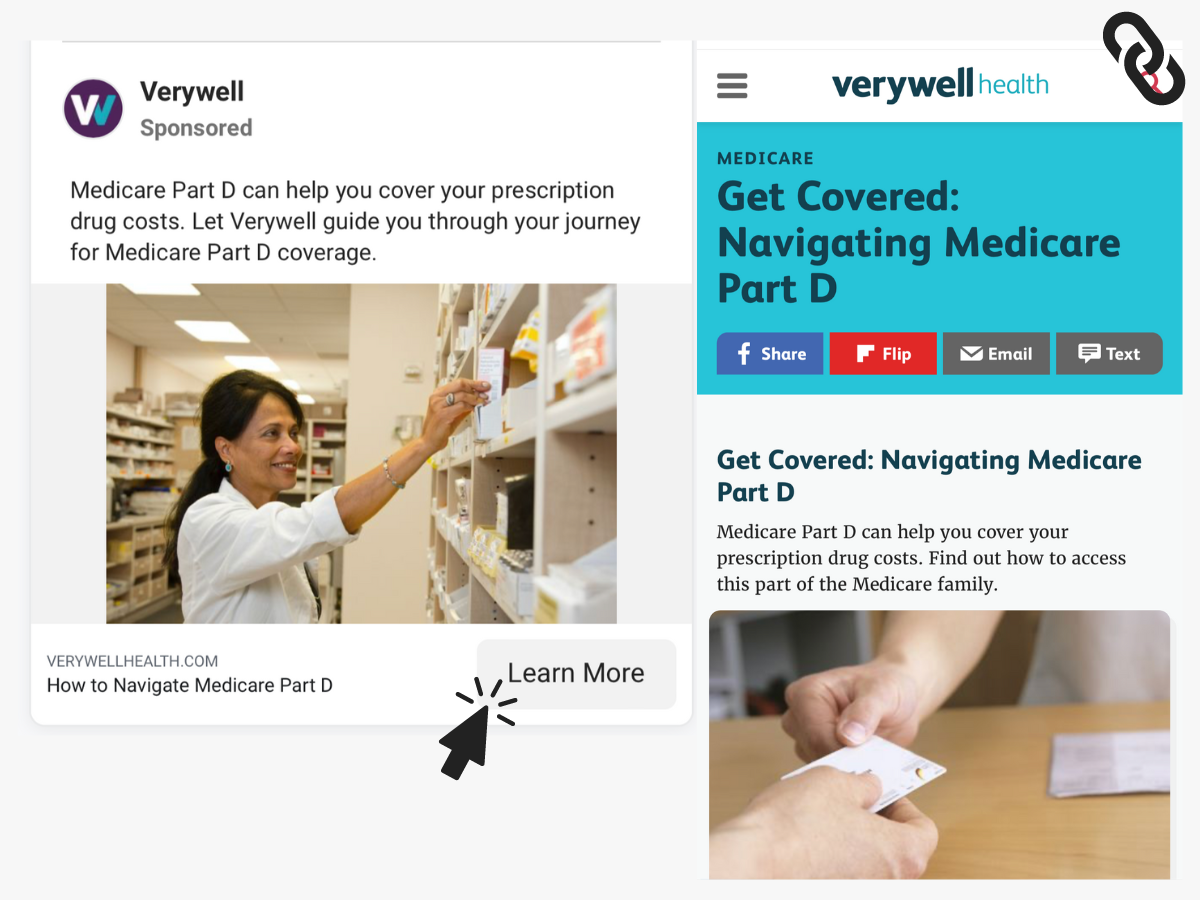
Verywell health is a niche medical information site focused on publishing up-to-date health information created and edited by healthcare experts.
The articles used in these brand awareness campaigns fall in line with Verywell’s mission to “help you make the best choices for your health…[and empower] you with the best answers to your most pressing [health] questions.”
Great promoted content should be relevant, valuable, and timely to your audience. When you get that down, these ads will be a powerful way to help audiences see your brand as authoritative and trustworthy.
Brands repping the helping professions – take note.
🤓For more on this topic: Understanding Your Users through Audience Analysis
7. Athena Health – Generate leads with tested copywriting frameworks
While I love comedy, wit is often ineffective at increasing conversions. By contrast, ads that use direct-response copy and trusted copywriting frameworks are built to inspire action.
Network-enabled healthcare services and electronic health systems provider Athena Health uses the copywriting formula AIDA to hook their audience of small to medium-sized physician practices and hospitals and drive action right now.
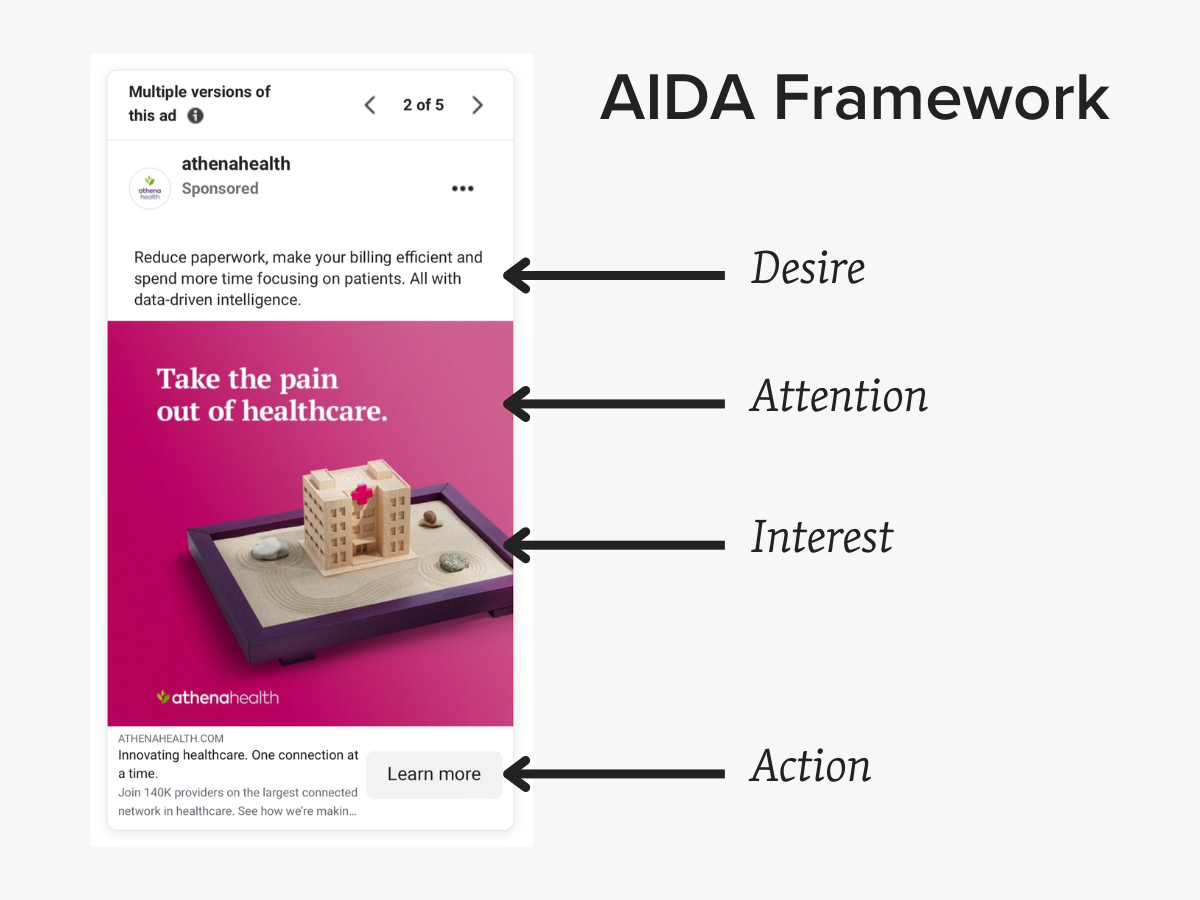
AIDA stands for Attention, Interest, Desire, and Action.
AIDA aims to hook your audience, invoke curiosity with interesting or appealing information, increase desire with benefits or proof, and encourage immediate action with a clear directive or next step.
In this example:
- Attention: The bold in-image claim, “Take the pain out of healthcare,” grabs users’ attention and makes them wonder, “how?”
- Interest: Your eye flows over the rest of the image – a peaceful, zen garden beneath a hospital building sits serenely against a hot pink backdrop.
- Desire: Now they want to know more. Users backtrack to your copy, where you hammer home your yummiest benefits: reduced paperwork, efficient billing, and more time for quality patient care.
- Action: the CTA ‘Learn More.’ Some social proof (Join 140K other providers) is even better.
This Athena Health example is especially effective because it takes advantage of the ad’s creative format. Unlike Search ads which rely on text-only, you can use illustrations and images to hook your Facebook Ads audience and stop users from scrolling further down their feeds.
🤓 For more on this topic: What is Direct Response Copywriting? 10 Real-World Examples
8. Betterhelp – Blend science & emotion to illustrate your solution
Betterhelp’s ad promoting their e-therapy service is a powerful example that you can speak personally to segments of your audience without violating Meta’s personal attribute standards.
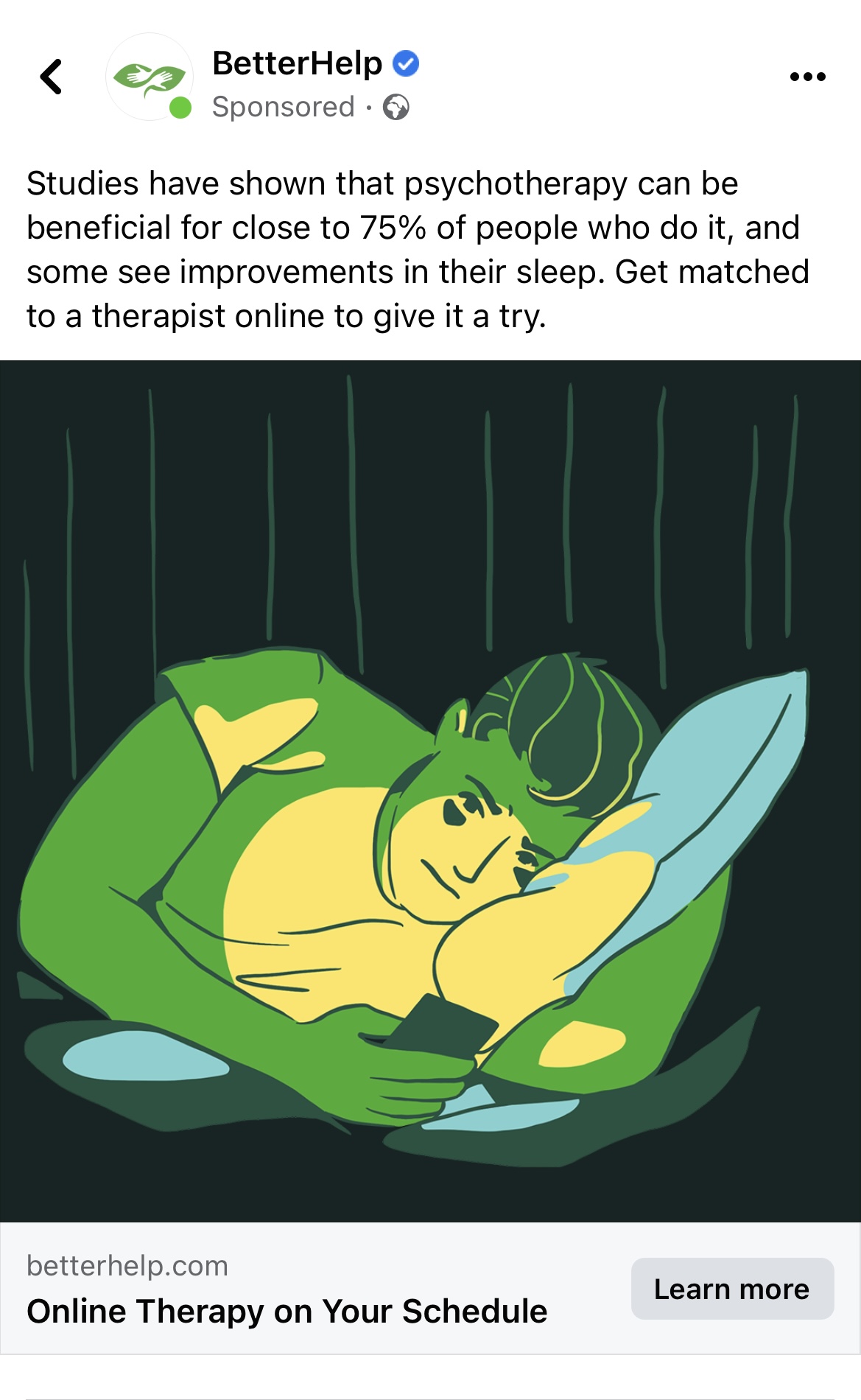
This Betterhelp ad makes the most of Facebook Ad images to empathize with and illustrate their audience’s current predicament: insomnia. But they also use the power of statistics to tell a story for a user.
First, they illustrate a problem: insomnia-driven late nights and loneliness.
Then, they reference a solution: psychotherapy, which is effective for 75% of people and can improve sleep.
Finally, Betterhelp makes themselves the bridge between problem and solution: Learn more about online therapy on your schedule.
It’s a perfect template for telling compelling stories to your audience that appeal to their emotion and logic.
9. Mayo Clinic – Leverage video to speak directly to patients
Video ads outperform static image ads on Facebook, according to 60% of marketers.
For health brands, video ads are an excellent way to increase their authority online and speak directly to prospective patients and customers looking online for health answers.
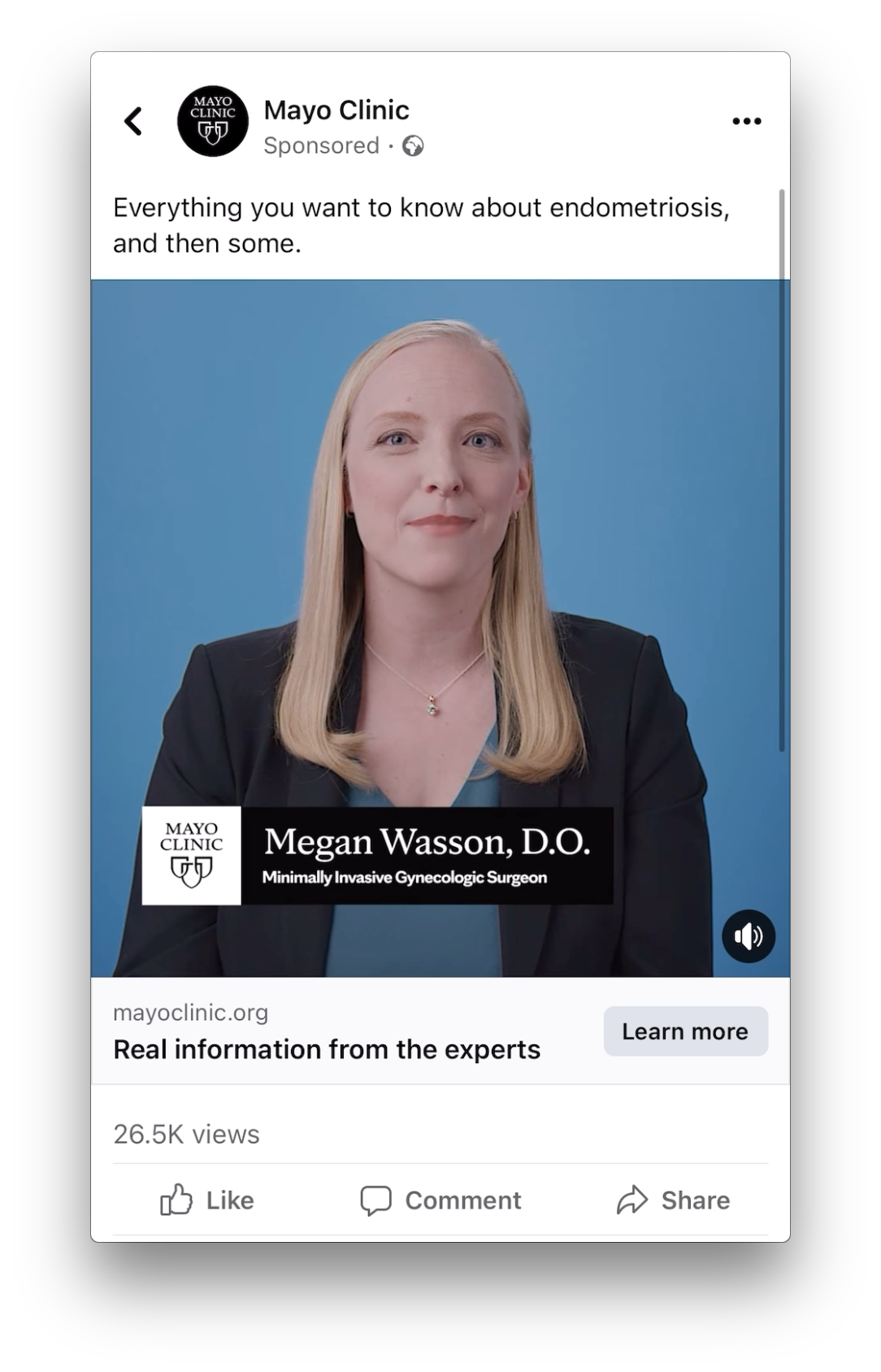
This video promoting endometriosis education hits several green video ads flags for us:
- It’s authoritative. Note the prominent “Mayo Clinic” branding and emphasis on the speaker’s medical qualifications. Both features make her message more trustworthy and compelling.
- It’s simple. Clean design, consistent branding, and a short message keep things clear and understandable.
- It’s short. Users have short attention spans and prefer videos that sit between 12-15 seconds long. This video fits the bill.
- It emphasizes credibility and clarity. The primary video slogan, “Real information. Real doctors. Real talk.” appeals to users’ need for credibility and clarity, both of which increase trust and conversion rates.
10. Banner Health – Highlight your best features with Carousels
Carousel ads are powerful when you want to visually show multiple services, tell a story with multiple images, or share multiple benefits with your product or service.
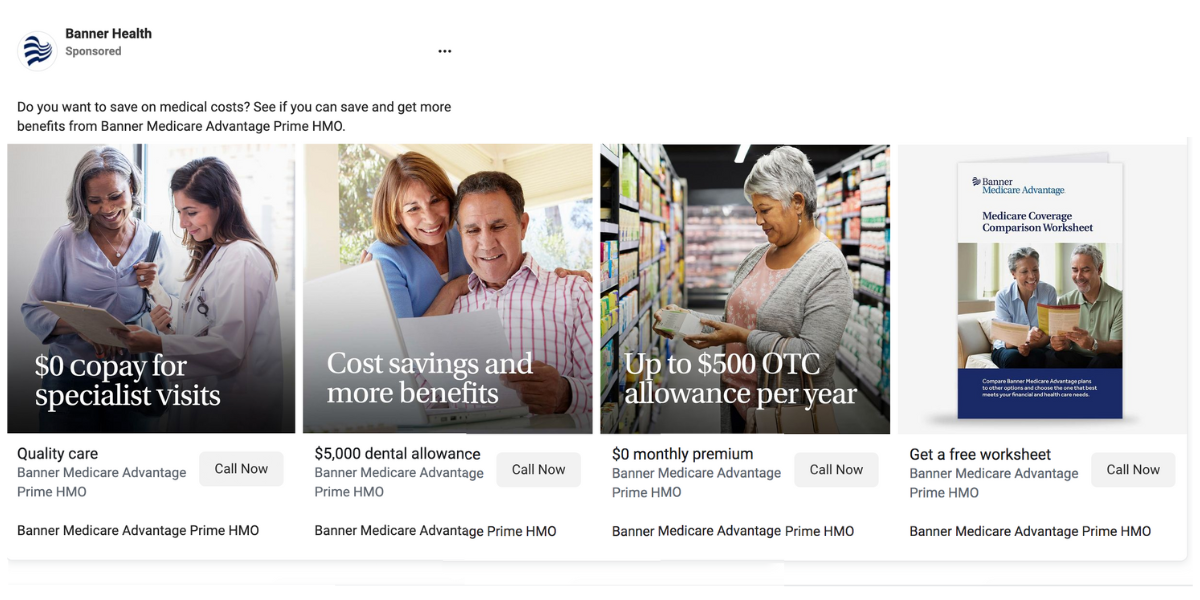
Banner Health nails it here. They include a carousel image for each segmented feature of their medicare health insurance package, which primes their mid-funnel audience to download a free coverage comparison worksheet.
For health brands, you can also use carousels like this to track clicks on each carousel card, which may indicate which aspects of your service are most appealing to your audience.
Use the data to form future ad testing ideas, and adjust landing page headlines and future ad messaging to match.
11. Picmonic – Capture attention with timely references
On Facebook, your creative has to stop users from scrolling.
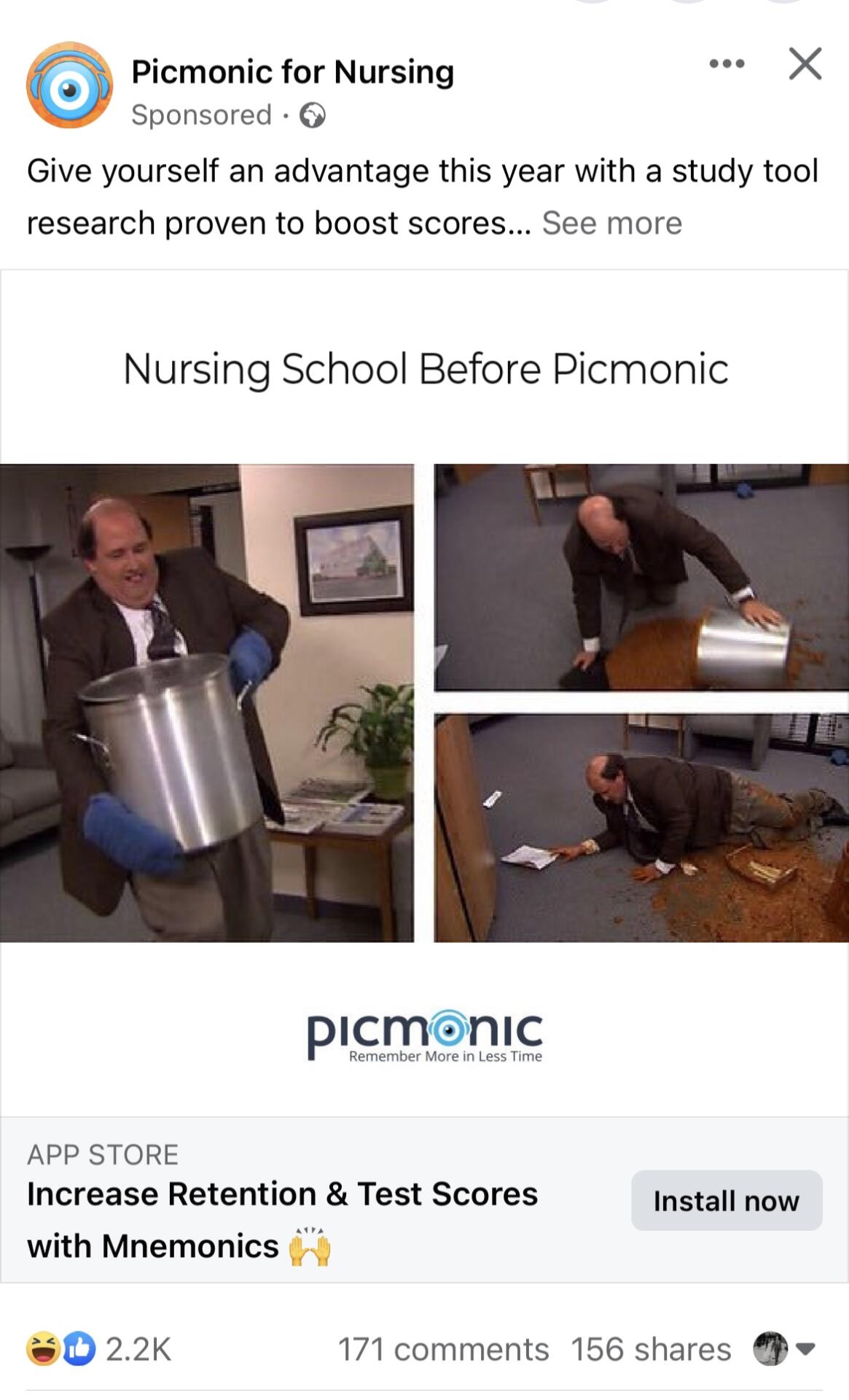
When relevant, memes can be a creative way to humanize your brand and hook your audience.
This ad inspired 2.2K likes and generated reach with 156 shares.
In this case, it’s better to reserve this creative for brand awareness ads or increasing impressions, as Picmonic does here.
While this ad successfully drove impressions and awareness for the brand, I will note that you have to know your audience before testing it out.
Think of meme-ified ad creative as a visual kind of “jargon.” Here’s what content marketing expert Anne Handley has to say about it:
Jargon is like cholesterol…there’s a good kind and a bad kind.
The good kind signals to others that you are an insider and you understand their world. The bad kind is often used when the speaker isn’t creative or smart enough to find better words. Or (worse) it’s used falsely: To elevate the speaker by making everyone else feel dumb, or to obscure meaning on purpose.
In sum: the ad is perfect if you’ve watched The Office.
Out of context, this ad won’t land as well.
Make sure you know which group your customers belong to.
12. Deplin – Reduce risk with guarantees
Deplin is a prescription medical supplement for the dietary management of depression.
And instead of promises about the impact or effectiveness of their product, they use something much more effective (and legally safer): guarantees.
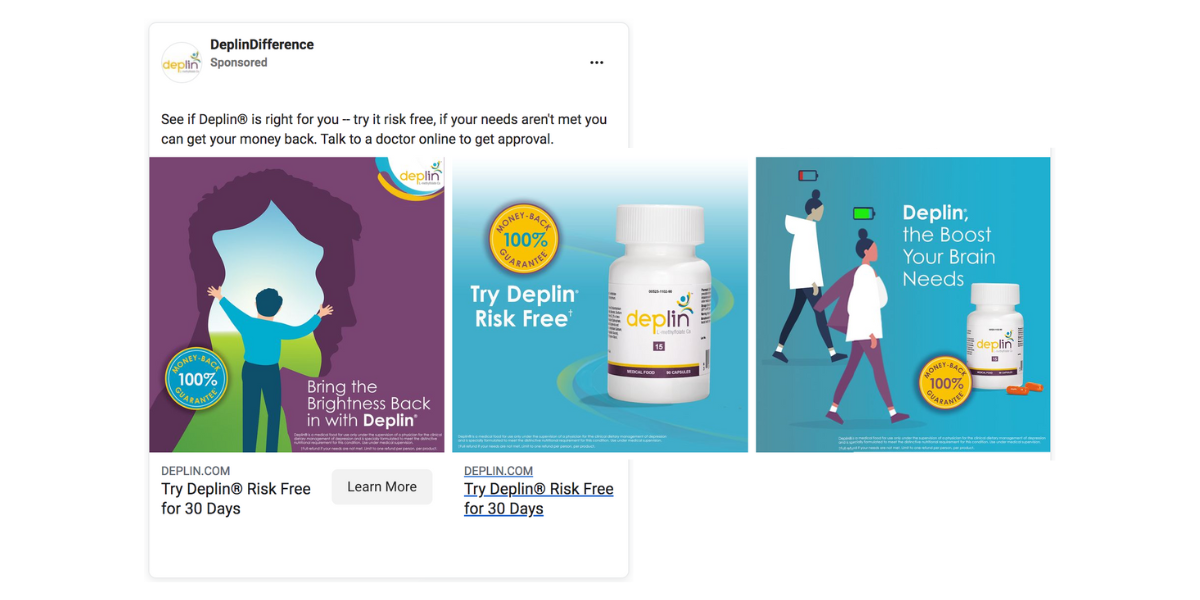
Guarantee badges (in this case, a 100% money-back guarantee) are a subtle but effective trust signal you can use on your ads today.
In this case study, guarantee badges placed prominently on a landing page increased sales by over 32%, with 98% statistical significance.
By decreasing perceived risk, you increase trust in your brand and lower the conversion barrier for sign-ups or product trials.
13. SilverFern – Spark curiosity with quizzes
Quizzes are a low-friction, mid-funnel offer that can serve multiple purposes for your marketing program.
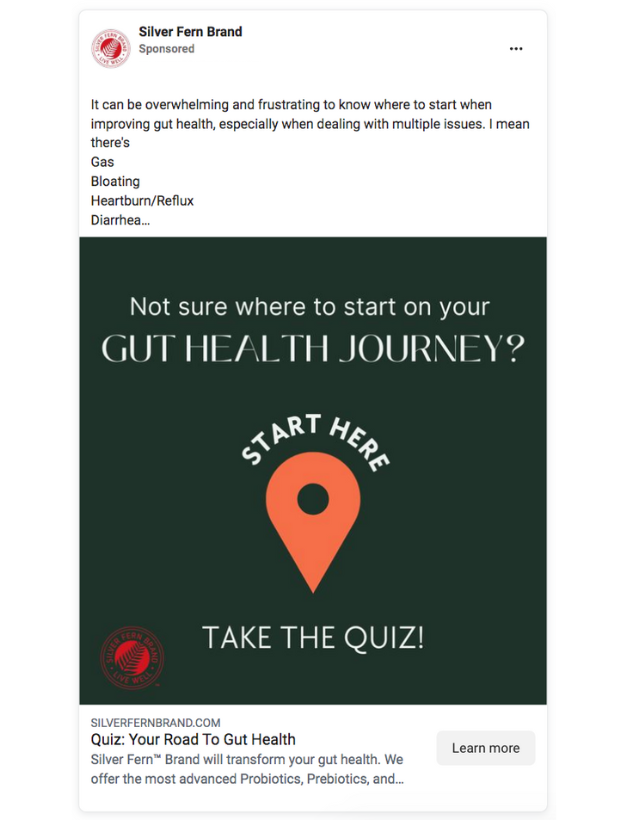
For Silver Fern, their quiz:
- Engages social media users
- Educates site visitors about gut health
- Guides prospective customers towards SilverBrand dietary supplements
- Generates valuable audience and customer data for future marketing campaigns
A note on that last one: anonymous quiz results are a form of voice of customer (VoC) data.
As a medical SaaS business or service provider, customer feedback is gold. Note trends from quiz results and use them to form testing ideas for new offers, ad creative, copy, targeting, and other health marketing assets.
🤓 For more on this topic: Research and Data Collection
14. Cefaly – Retain and reengage with current customer offers
Medical equipment supplier Cefaly knocks it out of the park with their ad for personalized coaching sessions for Cefaly devices.
This example below is ideal for re-engagement campaigns – campaigns designed to retain existing customers by promoting offers that encourage and increase their use of your product or service.
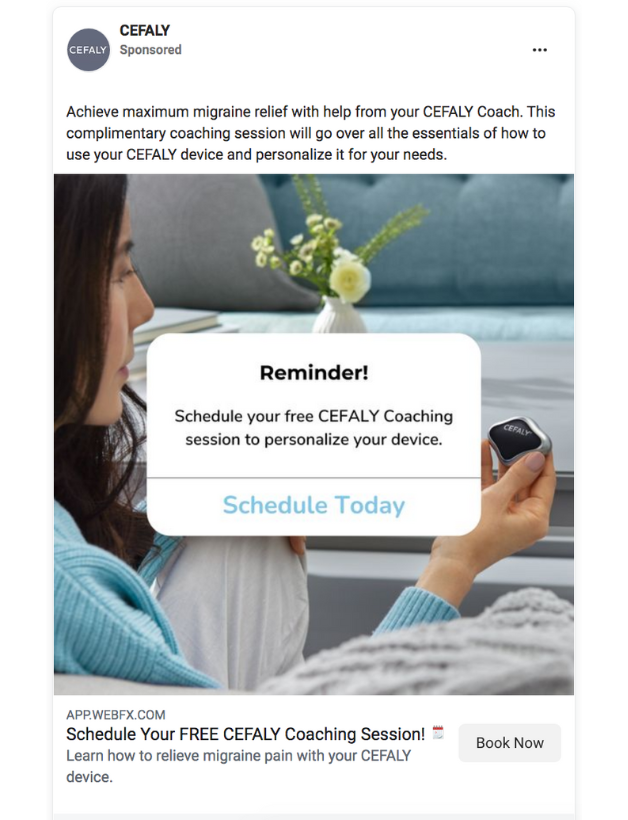
Campaigns designed to maintain your relationship with existing customers are a vital part of your marketing mix because they can improve sale success rates, profits, lifetime customer value, and costs per conversion, especially compared to new customers.
One improvement opportunity: it all comes back to targeting. When I crossed paths with this ad, the campaign was being delivered to non-Cefaly customers. The advertiser could likely decrease the CPA and increase the lead quality of this campaign if they restricted their audience to target existing customers.
Otherwise, they could edit the ad to fit general Lookalike audiences. Pitch customer support and a free coaching session as a primary benefit for new customers.
You can set up campaigns that target current customers by setting up Customer list Custom Audiences in Facebook Ads Manager (see below).
🤓 More on this topic: Facebook Custom Audiences: The Ultimate Guide
15. Advanced Sports & Family Chiropractic – Urge immediate action with scarcity
Scarcity is a tried-and-true method to encourage users to take immediate action.
Advanced Sports & Family Chiropractic achieves this by promoting a classic new-patient offer and limiting the number of available appointments.
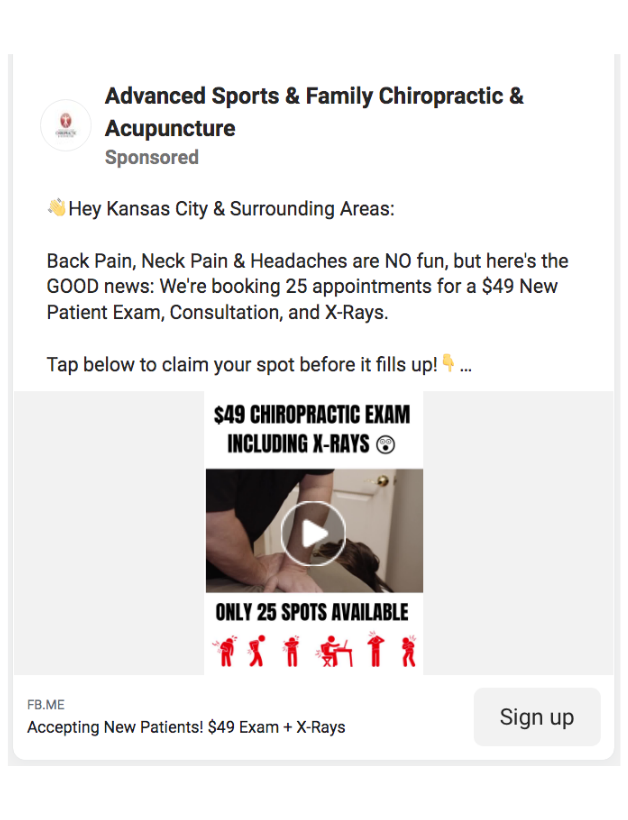
According to this study, limited time or supply influences potential customers by increasing perceptions of
- Urgency (want to act right now)
- Value (product/service is unique and valuable)
- Satisfaction (that they got a deal in time)
Trigger words (limited, few, hurry), short promotion period (today, this week only), seat limits, and countdowns are all test-worthy ways to inject urgency into your offer. (Use it in moderation!)
16. Allstar Chiropractic – Clarify who your offer is for
Patients may hold preconceived notions about who uses certain services. And audiences in the US often have questions about insurance coverage for many health-related services.
All Star Chiropractic does a good job of addressing both types of questions in their video ad.
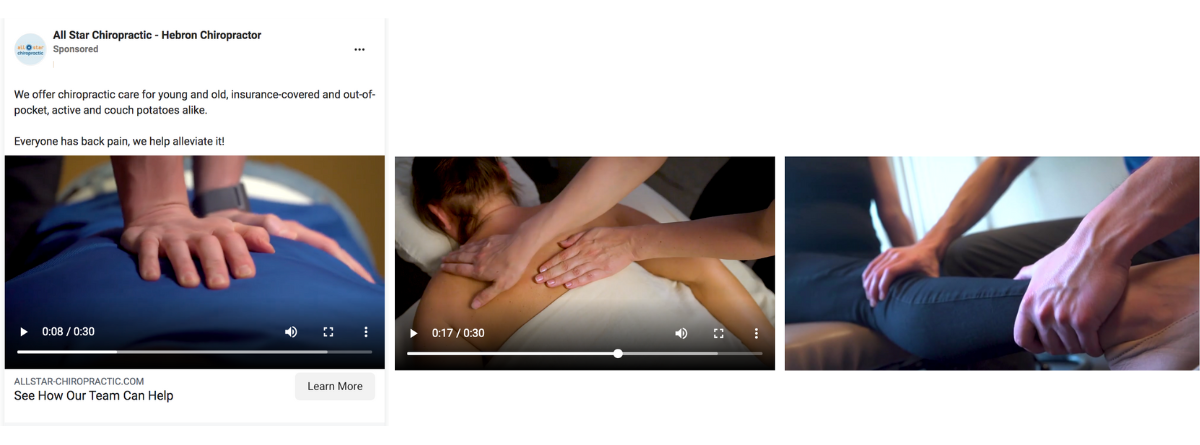
The ad is short and to the point, featuring the three segments of their service: spinal manipulation, massage, and physio.
It’s their copy that hits it home. They care for “young and old, insurance and out-of-pocket, active and couch potato alike.”
While some brands may benefit from niche-ing down and being specific about their target audience, the effect of this ad is still compelling.
The ad’s primary message: they’re not in the business of judging how you got your pain; they want to “help alleviate it.”
On the topic of insurance coverage and out-of-pocket costs: if you’re a medical services provider and health insurance coverage is relevant, promoting that information could be a powerful feature of your Facebook Ads.
In fact, The Beryl Institute reports that coverage information is one of the most important factors to consumers when making healthcare provider choices.
As a clinic or doctor advertising your services, you might hypothesize that highlighting coverage info in your ads and prominently on your landing pages may increase your brand trust, improving conversion rates.
17. Curex – Produce high-converting videos using the ‘Trifecta’
This video ad by Curex is pretty short but uses a straightforward, replicable formula you can easily copy for your Facebook health ads.
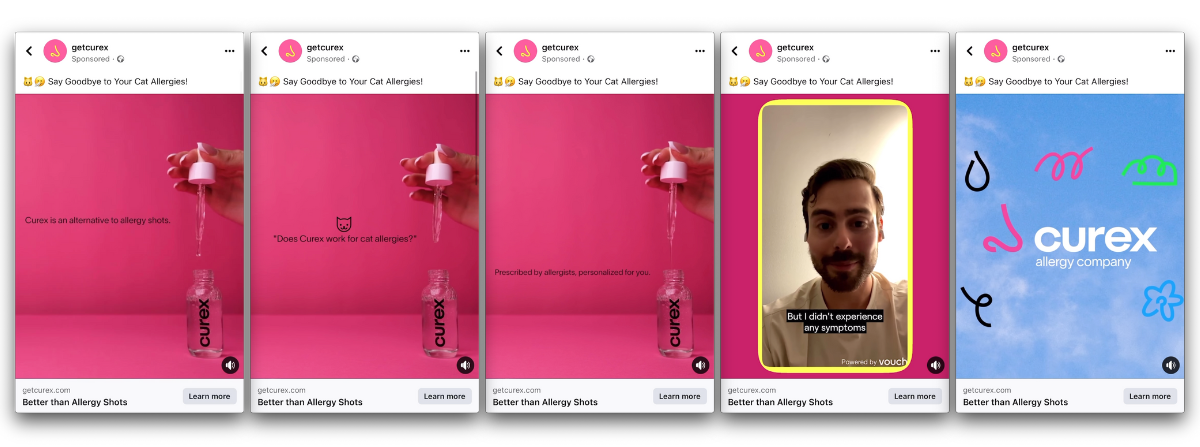
Here’s why this video ad works. We’ll summarize it as “the trifecta” of conversion-worthy ad elements:
- Well Designed – This has a clean, professional, and appealing design featuring a consistent brand. User Experience research cites design as the most critical factor users use to determine the credibility of web pages. To most users, what “looks good” is good–and more appealing to buy.
- Personalized – Curex’s ad speaks directly to a specific segment of its audience by addressing a common question about cat allergies. They even formulate their treatment for each customer’s needs. Personalization of health products and care delivery will continue to be essential to conversions. In this survey, most US consumers state that personalized customer experience makes them more likely to shop with a company.
- Authoritative – Health ads carry more weight when referencing an expert. Curex does this by highlighting that allergy experts formulate its products. The ad becomes more credible by using a patient testimonial to vouch for the allergy treatment’s effectiveness.
In summary, here’s a formula for your own “trifecta” video:
- Open with your product or service, including a short description with branding
- Address a specific customer question or pain point
- Highlight your expertise, authority, or track record
- Reference a patient testimonial
- Close with your company headline and branding
And if you can’t design it, finding someone who can is worth it.
18. Chirp – Let remarketing turn past site visitors into customers
Retargeting is one of the most powerful tools available to advertisers.
In this Chirp ad, retargeting campaigns capture information from previous site visitors and serve them product ads for their back and neck paid-relief tools on Facebook.
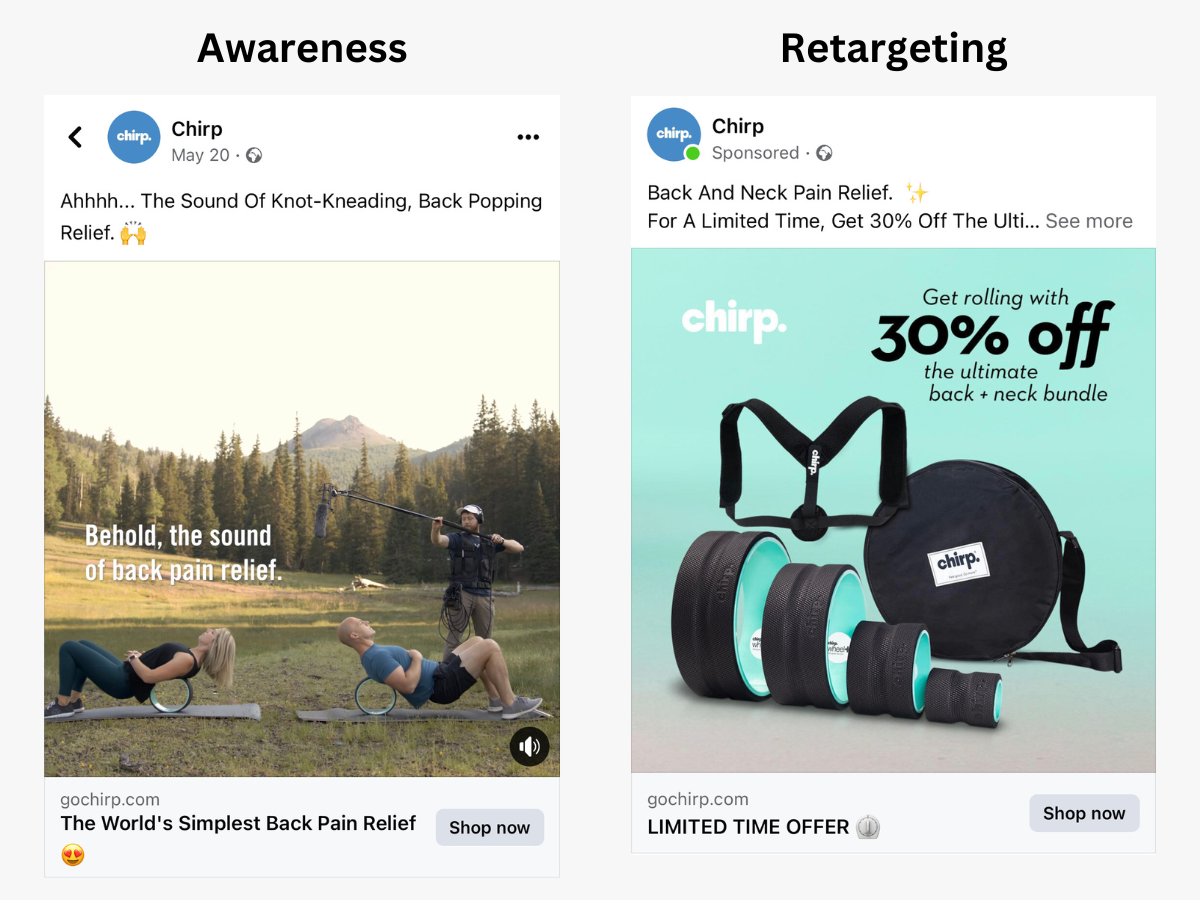
Bonus points for serving up a side of urgency with a limited-time offer bundle deal.
Remarketing / retargeting is often valuable to health and medical brands because it’s a competitive (and expensive) segment.
One strategy we use at Linear is to use Google Search ads and Facebook retargeting in tandem.
Use Google Search to attract high-purchase intent audiences to your website. However, competitive Google keywords often come with a hefty cost-per-click (CPC). Instead, use less-expensive Facebook remarketing ads to high-value audiences collected from Google Search ad traffic.
Larry Kim used this same tactic of using remarketing + Search ads to boost conversion by 51%!
🤓 More on this topic: Retargeting: The Marketer’s Guide To Bring Back Conversions
Create your own impactful Facebook Ads for Healthcare
You’ve had a taste of the best examples and tactics we can use on Facebook ads for Healthcare–to recap:
- Boost new patient sales with radius targeting
- Blast through performance plateaus with split tests
- Stay meta-compliant with lifestyle-focused images
- Make your offer make sense (The Wedge Method)
- Inspire trust with social proof
- Engage audiences with relevant content
- Generate leads with tested copywriting frameworks
- Blend science & emotion to illustrate your solution
- Leverage video to speak directly to patients
- Highlight your best features with Carousels
- Capture attention with timely references
- Reduce risk with guarantees
- Spark curiosity with quizzes
- Retain and reengage with current customer offers
- Urge immediate action with scarcity
- Clarify who your offer is for
- Produce high-converting videos using the ‘Trifecta’
- Let remarketing turn past site visitors into customers
We figure what you’re really hungry to see are your own ads out there kicking butt and taking (lead) names.
Have questions about how? Drop into the chat (or comment) below.
Or, request a personalized growth proposal, and see how we use Facebook Ads to multiply profits and patient numbers for leading health brands globally.
Ariana Killpack
Director of Content
Ariana prides herself on always learning everything there is to know about pay-per-click advertising and conversion rate optimization, which is why she can create such excellent content. When she’s not writing fantastic content, you can find her hiking, swimming, or baking bread.
Leave us a comment.
Subscribe to our blog
Subscribe to our blog
Get weekly PPC & CRO advice sent straight to your inbox.